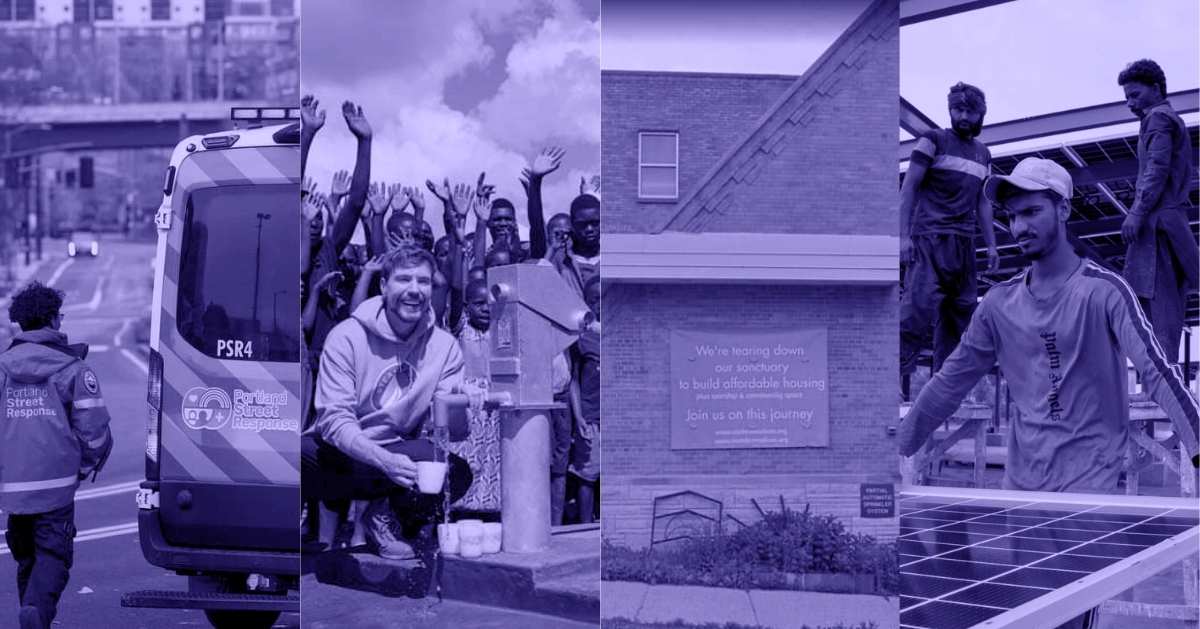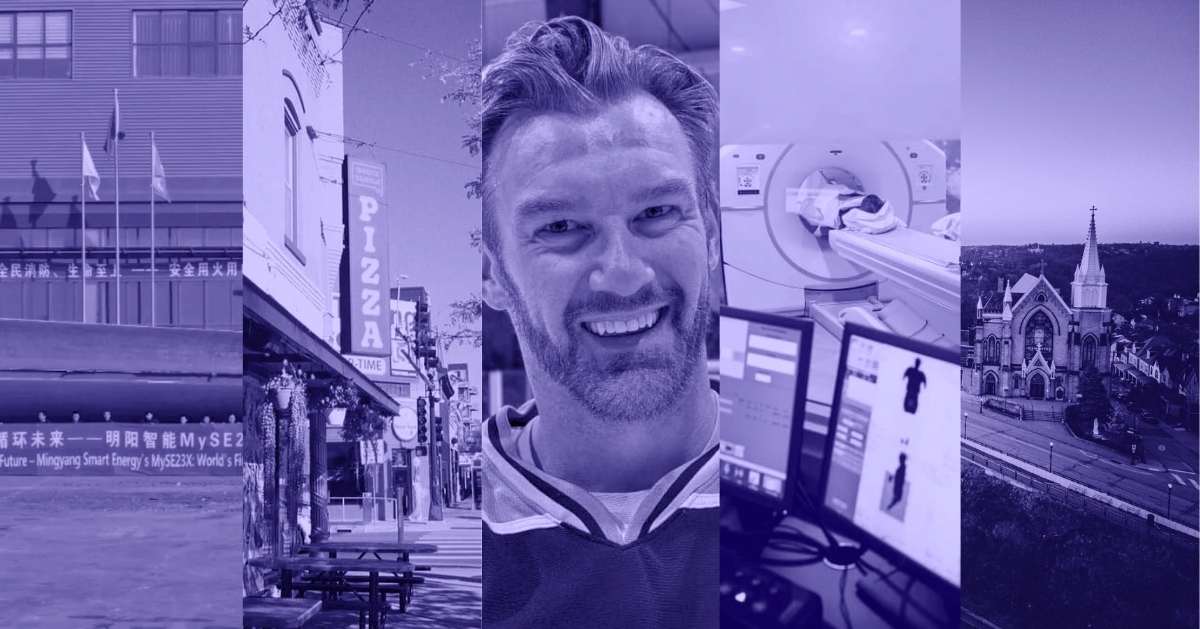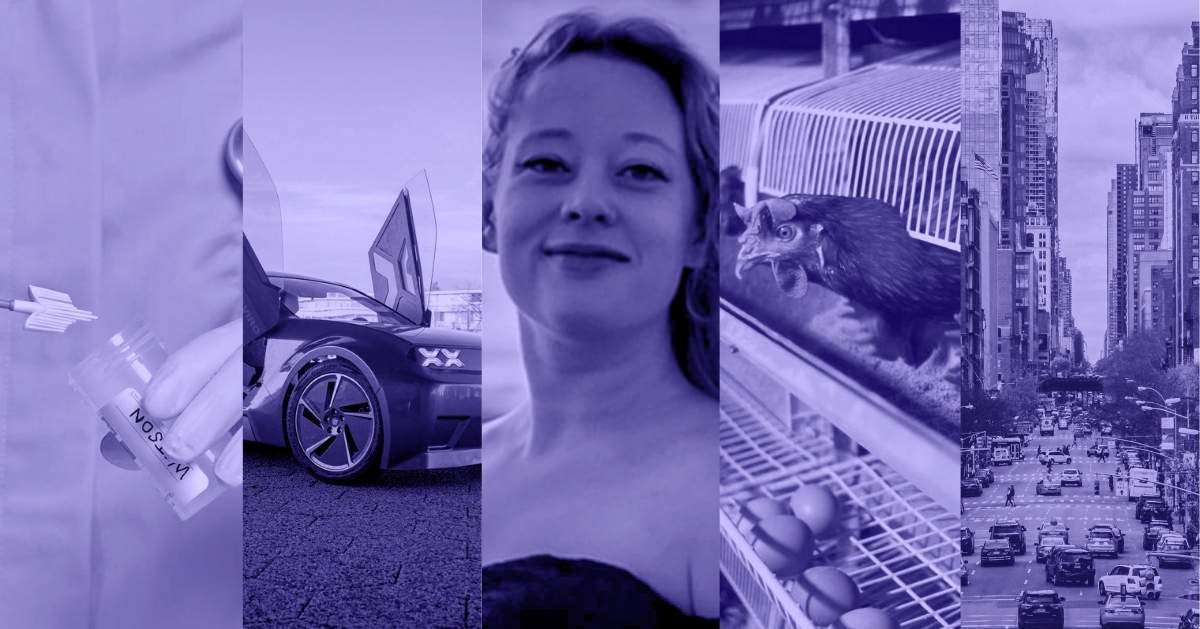Every day the Good Good Good team collects the best good news in the world and shares it with our community. Here are the highlights for this week!
If you want to get good news in your inbox every day, join the Goodnewsletter — the free daily newsletter designed to leave you feeling hopeful.
The Best Positive News We’re Celebrating This Week —
Portland is expanding its first responder team dedicated solely to serving those having mental health crises
The Portland Street Response has worked as an alternative first responder agency to serve people having mental health issues. Unarmed staff members are dispatched to provide services to those with suspected substance use issues, who have unmet basic needs, like housing, and more.
PSR has fielded nearly 40,000 calls since 2021, and calls are up 19% compared to last year. To grow with the rising demand, the agency is adding 14 more staff members and working to strategically place staff around the city to provide faster response times.
Denver has implemented a similar program since 2020, also expanding after seeing enormous success in patient outcomes.
Why is this good news? Police officers are trained to respond to crimes — and a mental health crisis is not a crime. Even paramedics are sounding the alarm on their own lack of training here. Having dedicated teams who are specially trained to provide adequate care for someone struggling with their mental health is a better solution than relying on police or other first responders to handle these incidents.
A nonprofit is helping teens find mental health support where they already are — on social media
Providing reliable, cheap electricity, solar power is growing in Pakistan at an “unprecedented” rate
Driven by demand from citizens frustrated by skyrocketing electricity prices and unreliable supply from an aging power grid, Pakistan is seeing a solar boom that’s making it one of the largest adopters of the renewable energy source in the world.
And with an overabundance of solar panels available thanks to its neighbor, China, steadily ramping up production, the number of homes and buildings installing solar power systems has happened at an “unprecedented” rate.
In 2024 alone, solar imports to Pakistan tripled in just one year, to nearly $2.1 billion. That’s expected to continue this year, with the country already importing 80% of last year’s milestone in the first nine months of 2025.
Why is this good news? Pakistan is proving that abundant, renewable, inexpensive solar energy is a great investment — for individuals and communities. Community members are even coming together to pool their resources to install solar panels on buildings like mosques, which struggle to afford rising electricity prices from the country’s grid.
Belize, Guatemala, and Mexico are working together to create the second-largest nature reserve in the Americas
After Vermont banned plastic bags, usage went down 91%
In 2020, Vermont enacted a law that prohibited businesses from offering plastic bags to customers and only made paper bags available in exchange for a $0.10 fee. A new analysis from the University of Vermont has found that the law appears to have worked, with plastic bag use dropping 91% across the state.
The survey also found that 70% of respondents viewed the legislation positively, and a number have changed the way they carry their goods. Some who previously used paper bags decided to stop once a price tag was introduced, and others had already been using reusable bags and continued to do so.
Overall, the researchers found that the policy’s success was due to a “bottom-up” effort from citizens who pushed state legislators to enact a ban due to environmental concerns surrounding single-use plastic.
What’s the nuance? Researchers found that while the law led to a near elimination of plastic bag use, paper bag use increased by more than 6% during the same time. They suggested that other states pursuing similar laws might consider including paper bags in their initial legislation to curb the use of disposable bags altogether.
→ Read more
MrBeast, Mark Rober, and other YouTubers raised over $40 million for #TeamWater to fund clean water projects
Last month, famous YouTuber MrBeast (a.k.a. Jimmy Donaldson) joined his fellow YouTuber and engineer Mark Rober to announce a major fundraising campaign: #TeamWater. Taking place throughout August, the project aimed to raise $40 million to fund clean water projects around the world.
The campaign brought together content creators from 144 countries, reaching billions of subscribers through videos, livestreams, and social media content, including a 17-hour livestream that raised $12 million toward the total goal.
And they officially surpassed their goal, raising over $41.5 million for the nonprofit WaterAid, which will supply an estimated 2 million people with access to clean water for decades.
Why is this good news? WaterAid CEO summarized it perfectly for us: “This will have ripple effects for decades to come. Girls and women who spend hours collecting dirty water can go to school or earn a living. Healthcare facilities can provide the care people need. It will change lives. We know the path and outcomes of a child born with access to clean water differ dramatically from those of a child who is born without.”
→ Read more
A story about Travis Kelce donating a house to the homeless was AI-generated — another NFL player just did it for real
A new poll found that a majority of Americans view affordable housing positively and want to see more in their neighborhoods
While NIMBYs might express concerns about crime, congestion, schools, property values, and “quality of life” changes that might come from affordable housing developments, most Americans have been affected by the housing crisis and, therefore, hold evolving beliefs about what it means to solve the problem.
A new poll found that 63% of respondents viewed the term “affordable housing” positively. In fact, 83% of people viewed affordable housing more positively than other forms of multi-family housing, compared to townhomes (76%), apartments (70%), and mobile or pre-fabricated homes (64%).
The respondents also shared what kind of affordable housing policies they would be supportive of, with 65% of people saying they’d likely support new housing being built in their neighborhoods.
→ Read more
A church in Wisconsin is demolishing its current worship space to build 110 units of affordable housing
St. John’s Lutheran Church has been situated in the same spot, just a few blocks from the state Capitol building in Madison, Wisconsin, for nearly 170 years. Always a place “focused on refuge, serving the poor, and meeting people where they are,” its leaders want to live up to that in a new way.
The church is planning to demolish its existing worship space to build a 10-story, multi-functional building that will not only have a worship space, but also a community center and more than 100 units of affordable housing.
The idea came about from conversations around how the congregation could best give back to the community, and now the $58 million project is about to break ground, with the goal to be completed in the next two years.
Why is this good news? City officials say the building will be the first new affordable housing project in almost 20 years. For people who have been able to find housing in the area, they’re burdened with paying as much as 70% of their income on housing costs — this new building would have capped rents in tiered pricing based on income.
After the loss of 2024, these progressive candidates are making politics fun again: ‘We can win anywhere’
→ Read more
Former poachers are now employed as rangers to patrol beaches and protect endangered sea turtles
On Cabo Verde’s islands, local residents are being employed by conservation organizations as rangers to monitor, patrol, and protect endangered and threatened sea turtles on the same beaches where they used to poach them.
Along with legislation and tourism, these conservation efforts have led to a dramatic reduction in turtle harvesting, which locals traditionally consume, use in traditional medicine, or sell on the black market.
Between 2007 and 2024, illegal catches of female turtles on one island alone fell from 1,253 to just 20, and loggerhead turtle nesting sites increased seven times.
More good news of the week —
A recent study found that the global suicide rate has fallen by nearly 30% since 1990. Researchers noted that, in Europe, responsible media reporting and efforts to build social and emotional skills could have contributed to the decline, as well as improved access to care, reduced stigma, and suicide prevention programs.
To Write Love On Her Arms launched its annual Suicide Prevention Campaign to raise $250k by the end of September. The “I Hope You Stay” campaign will fund 2,800 hours of therapy for people who can’t otherwise afford care and fund thousands of searches in its FIND HELP tool to make it easier for individuals to connect with local, affordable mental health services.
Despite the national line shutting down, Illinois is keeping its dedicated 988 suicide crisis lifeline for LGBTQ+ youth. The 988 lifeline was launched in 2022, going on to develop a subnetwork of trained crisis counselors to help LGBTQ+ youth and adults under 25 who are disproportionately at risk for suicide and other mental health struggles.
A Chicago coffee shop gives 100% of its profits to mental health outreach and proactive suicide prevention. Now with two locations in the Chicago area, when Sip of Hope first launched in 2018, it became the first coffee shop in the world to put all of its proceeds toward proactive suicide prevention and mental health education.
A first-of-its-kind mental health hotline is supporting farmers and ranchers. The AgriStress Helpline for Farmers and Ranchers is staffed 24 hours a day, seven days a week by professionals trained to work with members of agricultural communities and is available in Wyoming, Pennsylvania, Texas, Missouri, and Virginia.
A shelter dog made his debut as the first-ever “morale dog” to be stationed on a U.S. Navy ship. Raider will offer support through “structured interaction, presence, and engagement,” and support trauma recovery therapy, participate in group sessions, visit service members’ families, and offer moments of connection and care “when it’s needed most.”
Reaching over 100,000 workers, 41 countries have implemented mental health and resiliency training for healthcare workers. Difficult working conditions coupled with high rates of anxiety and depression — over one in three health workers have suffered from these conditions since the start of the COVID-19 pandemic — not only impact worker retention, but also the well-being of people who deserve health and safety, too.
The Conservation Fund purchased North America’s largest blackwater swamp, saving it from a mining company. Spanning from southern Georgia into northern Florida, the Fund’s purchase is critical to protect the entire Okefenokee National Wildlife Refuge, including more than 350,000 acres of designated wilderness.
A women’s group in northern Ghana is proactively reviving the region’s forests through natural regeneration. Reforestation efforts like large tree plantings with nursery-grown seedlings fail under harsh conditions, so the women have been pruning shoots from living trees dispersed by animal droppings to encourage stronger regrowth.
A new joint effort by California and Nevada is protecting Lake Tahoe from a record amount of polluted runoff. By restoring wetlands and streams, limiting dust from roads and construction sites, and improving stormwater systems, the states dramatically reduced pollutants that fuel algae growth and are known to reduce Lake Tahoe’s world-famous clarity and water quality.
Scientists discovered that kelp forests provide powerful protection against storms in coastal communities. Much like mangroves, researchers found that dense kelp beds could knock down as much as 70% of a wave’s energy before it reached the shore, giving vulnerable coastlines a natural shield against erosion and storm damage, an especially helpful discovery as storms grow in intensity and frequency.
South Australia secured enough federal funding to become the first grid in the world to reach 100% net wind and solar energy. Reaching the milestone will be a landmark both for the state and for advocates of the renewable energy transition, particularly as conservative and legacy fossil fuel interests continue to push back on the idea that a modern economy can be powered by renewables.
Incoming students at a college in Virginia are moving into solar-powered shipping container dorms. Providing a “modern, comfortable living environment,” the dorms at Roanoke College feature suite-style rooms, where students have standard bunk beds, two desks, storage space, a vanity with a sink, private bathrooms, and individual, in-room thermostat controls.
New sensor technology is making it easier to cool communities and tackle urban heat islands one block at a time. While the idea of reducing heat across an entire city or neighborhood is daunting, targeting specific blocks that need assistance the most can be faster and a much more efficient use of resources.
A company in Nigeria developed a bionic arm to make prosthetics more accessible. While Nigeria has no precise data on how many citizens use prosthetics, the devices have long been inaccessible or unaffordable to a significant number of amputees and other Nigerians who lack a hand.
Thanks to good weather and rapid growth, solar power generation in Britain this year has already surpassed 2024’s total. As of mid-August, some 14.08 terawatt hours of electricity were produced from solar in Great Britain, about one-third higher than at this time last year, and enough to power 5.2 million homes for a year, or the London Underground for more than a decade.
Fire-resistant homes were 3D-printed in just 16 days in fire country and “will stand strong 100 years from now.” Two homes were just completed in Buena Vista, Colorado by VeroTouch, a construction technology company that “believes housing is a fundamental human right, and that solutions to the housing crisis will come from private sector invention and investment.”
Three Scottish brothers set a new record for the fastest unsupported row across the Pacific Ocean while raising money for clean water projects. Rowing over 9,000 miles non-stop from Peru, they endured storms, seasickness, injuries, and violent storms, including one that swept Lachlan overboard, while raising over $945,690 toward a £1 million($1,350,450 target for clean water projects.
A new stethoscope powered by AI could detect three heart conditions in seconds. Researchers say the tool could be a "real game-changer," resulting in patients being treated sooner. It takes an ECG, recording electrical signals from the heart, and sends the information to the cloud to be analysed by AI trained on data from tens of thousands of patients.
Egypt became the first African nation to win the Homeless World Cup in the tournament’s 20-year history. Staged for the second time since FIFA lent its official support last year, the Homeless World Cup brought 63 teams from 48 nations to compete in Oslo, Norway. On the women’s side, Uganda’s team won the title.



